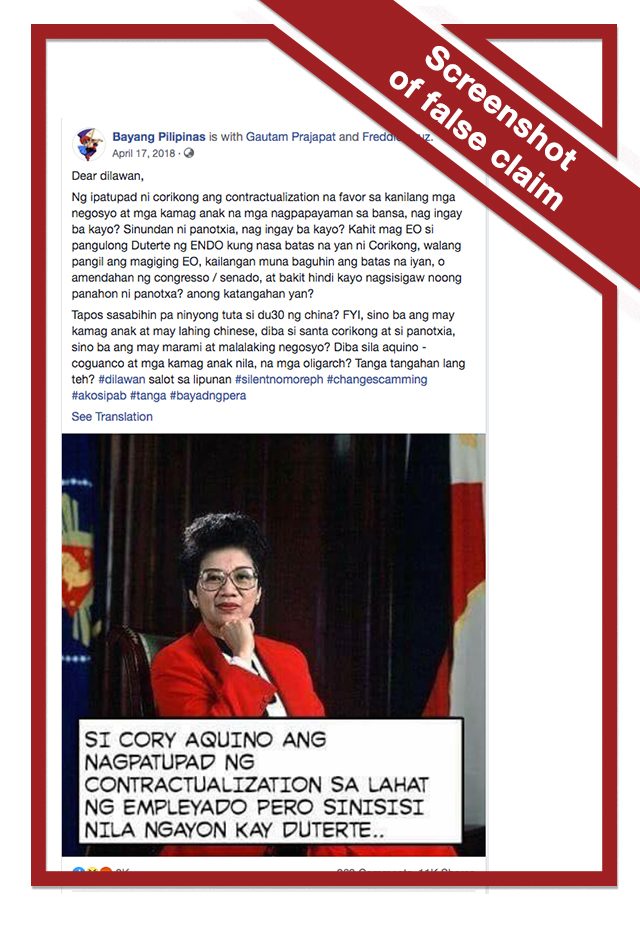SUMMARY
This is AI generated summarization, which may have errors. For context, always refer to the full article.

Claim: President Rodrigo Duterte should not be blamed for contractualization because it was implemented during the administration of the late president Corazon “Cory” Aquino.
In a post dated April 17, 2018, Facebook page Bayang Pilipinas pointed out that because of the existing law on contractualization, abolishing it will require amendment or another act of Congress. A mere executive order signed by Duterte won’t be sufficient.
The post includes a meme with a photo of Cory Aquino and text that reads, “Si Cory Aquino ang nagpatupad ng contractualization sa lahat ng empleyado pero sinisisi nila ngayon kay Duterte (Cory Aquino implemented the contactualization for laborers, but they are blaming [President Rodrigo Duterte]).”

The post was revived as seen on Crowdtangle, when Facebook user Dewn Javier reposted it on Labor Day (May 1) on the public Facebook group President Rody Duterte Facebook Army.
The old post is still getting engagement today. It has generated almost 11,000 shares with over 3,000 reactions and 900 comments, as of writing.
Rating: MISLEADING
The facts: Labor groups are calling out the President not because contractualization was implemented but because he failed to deliver on his campaign promise to end it in one week.
A week after Duterte declared his presidential bid in November 2015, he vowed to phase it out if elected, saying that contractualization is not good for the country. (READ: LIST: Priority bills of the Duterte administration)
After 100 days in office, labor groups were dismayed that his promise was not fulfilled.
Some labor groups, like Federation of Free Workers, the Kilusang Mayo Uno (KMU), and Alyansa ng mga Manggagawa Laban sa Kontraktwalisasyon (Almakon), slammed the President for not keeping his word to favor Filipino workers.
Only the Associated Labor Unions-Trade Union Congress of the Philippines (ALU-TUCP) still expressed optimism that Duterte would not renege on his two-year promise.
In February 2018, Duterte held a dialogue with labor group leaders at Malacañang to discuss labor rights, including putting an end to ENDO, short for “end of contract.”
The disappointment of labor groups continues after Duterte signed an executive order banning contracting and sub-contracting, which is not in accordance with their plea. (READ: TIMELINE: Duterte’s promise to abolish endo)
Presidential Decree No. 442 or the Labor Code was signed in 1974. Since it was amended in 1989, the Philippines has been practicing the Herrera Law, permitting companies to hire workers on a contractual basis.
Having only executive powers, Duterte leaves the amendment of the 45-year-old Labor Code to Congress. He then urged Congress to pass pro-labor measures, including the Security of Tenure and End of Endo Act of 2018, which he certified as urgent in September 2018.– Glenda Marie Castro/Rappler.com
Keep us aware of suspicious Facebook pages, groups, accounts, websites, articles, or photos in your network by contacting us at factcheck@rappler.com. Let us battle disinformation one Fact Check at a time.
Add a comment
How does this make you feel?
There are no comments yet. Add your comment to start the conversation.